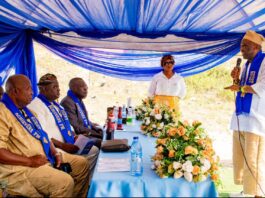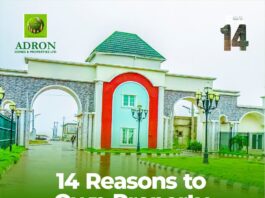
The glint in his eyes reflects through his spectacle. There is fervour in his eloquence as he talks about the Governor Akinwunmi Ambode administration that will come to an end in a matter of days. Steve Ayorinde, the Lagos State Commissioner for Tourism, Arts and Culture, in this interview, talks about the transformation Lagos has experienced in the last four years and its impact on the megacity’s economy. Excerpts:
You have been part of the outgoing Governor Ambode’s administration since inception. How has it been in the last four years?
Nice, enjoyable, eye-opening, challenging and at the same time a learning process to serve in government and at the end of the day, it is education, opportunity to contribute one’s quota to the wellbeing of your people. I was a journalist and you know there is no night in the newsroom when we were in the newsroom it is either filing reports, editing or writing opinion articles. Sometimes, we are shielded on how government operates and how the public sector works. Only when we attend their events for press conferences or meetings with top functionaries in government – even when you do that you only listen to them.
You do not have a deep understanding of how government works their limitations, the very meaning of bureaucracy and all that. So when you come in on invitation or whichever way and you have an opportunity to serve in whichever capacity especially if it is a cabinet position, it means that you are now part of the decision making. So you know, you learn and if you are the type, like many of our senior colleagues and friends, who will have to return to the newsroom, or to media-related setting, you will be coming with a different perspective and hopefully maybe you would have had an opportunity to at least try to impact on what you met in the system. For me, I have an understanding of how Lagos works. So, I have enjoyed the experience, I have learned from it.
As the commissioner for tourism, arts, and culture, your tenure will be over in less than one week, what are some of the achievements of Lagos State in terms of tourism?
Tourism has been one of the cornerstone ministries in this administration. But I think the first kudos that we should give to this administration, particularly the governor, is that for the first time Lagos now has a ministry that is wholly devoted to matters of tourism and culture. It’s never used to be like that. Tourism cohabited with inter-governmental relations before now, and then the culture was under the home affairs ministry. So the first thing the governor did was to say let us bring every agency, department that is about the creative economy under one roof and create a ministry.
So, he removed culture out of home affairs and tourism out of inter-governmental relations and now created tourism and culture. If you recall at the federal level, the argument has always been, don’t subsume tourism and culture under information ministry, which is why you have a minister supervising culture and tourism and information. Here, information and strategy are separate but culture and tourism didn’t stand alone until 2015when the governor came. So I think that is a major achievement because it gives you focus, the strategy is undivided, there are no distractions, everything that you are dealing with whether it is about infrastructural development, whether it is about policy ideas, content, whether it is about stakeholder engagement, they are all about tourism, art, and culture. I think that is important and it is a major achievement.
Looking at Lagos State in terms of the transformation, you have theatres in the state’s four divisions. What’s the economic impact on Lagos?
It is said in tourism development in Africa that one out of every new 10 jobs created in Africa, one is from tourism and culture. This also applies to Lagos. Because the economic value of what this government has done is that it has engendered the development of tourism activities around tourist areas in the state. You look at what we do every December, One Lagos fiesta, it is by far the biggest open-air end-of-year concert anywhere in Africa. It runs for eight straight days in five different divisions of the state. Do you know how many people have benefitted from this initiative? From those who will construct the stage to food vendors, water sellers, taxi drivers, local dancers, comedians, master of ceremonies (MCs), it means that people in Epe, Badagry, Ikorodu, and Agege, who otherwise would have wanted to go to bar beach for such a show now have something of their own. And we hear from people, from vendors, food sellers, who say that in eight days of One Lagos Fiesta they make more money than what they would have made in three months. The economy is developing, because you have multinational like NB Plc, Pepsi, GTBank, etc., being part of it.
Does it mean that you have achieved the purpose, because people seem to think the culture of theatre is dead?
What Terra Kulture has shown to us is that it is thriving, what Freedom Park has shown to us is that thriving and that it can attract sponsorship. OLM has shown to us that big music concert even by the government can attract sponsorship. So the theatre is not dying but a theatre facility anyway is not just for live theatre activities alone, if you give, say Oregun theatre or Igando theatre, to a technical management facility person that will run it, maybe theatre shows just like Bolanle does at Terra Kulture, maybe once a week alone or once a month, but the comedy shows are there, they sell, the hall is packed full, they have a way of getting sponsors. Rehearsals will be there, musicals will be there, traditional shows, teen screening will be there, so it depends on how you now manage all these things to ensure that the theatres are kept busy.
Everybody knows that partnership with the private sector thrives anywhere in the world and in terms of the government talking about sustainability, what measures have been put in place?
If the government runs it, you know how it is, most of the government’s activities shut down at 4 pm yet you will have a 24-hour thing. By government, I mean civil servant can’t run it. We have commissioned two, Epe will be commissioned on Friday and then Badagry on Monday. So, what we are doing now is that we are test-running the place with our cultural troupe, the Foot Prince of David performed for the President at Oregun theatre while our performing troupe performed for the governor at Igando theatre. But then because a new government is coming in, the management contract of how they will be run will be executed by that government so that they can start afresh. But government can run it because we already have a working model, the government gave money to an architectural farm under Fashola’s regime to turn the old colonial prison on Broad Street and that is what has become Freedom Park. Freedom Park today is probably the busiest park space in Nigeria: restaurants, galleries, conferences, and shows – everything – can be found there. Guess what, after building that structure, which government paid for, the government now handed it over to the same architectural firm and say we can’t run it, run it for us and remit money to the government. You know we are also building the JK Randle Centre for Yoruba, you and Culture at Onikan, for which it is at 35 percent completion.
In terms of beautification, Lagos has been transformed significantly. Is the trend going to continue with the new administration and again how has this beautification affected tourism in Lagos?
I have no doubt that it will continue. If you recall, there are five pillars that Governor Sanwo-Olu wants to focus on. The fifth pillar is for tourism, culture, and sports. So I believe that the level where we have taken matters of tourism and creative economy to, it is only logical for the incoming administration to continue. And in any case, two key documents that will assist the incoming administration to succeed will be presented to the incoming administration. First, is the Lagos Tourism Master Plan, which is a 20-year document, it is the blueprint on how tourism will grow in Lagos State (2018-2038). Second, is the Lagos State Tourism Promotion Agency Law, it is a bill that has been passed into law by the House of Assembly and signed by the governor.
What measures are there to keep Lagos safe and sustain its tourism drive?
I think what needs to be done is to continue along the line that we have started in 2015, which in itself is also a continuation of the attention that the Asiwaju’s time and Fashola’s time gave to matters of security. But governor Ambode added to the whole thing in 2015, when he rebranded RRS, which was also acknowledged by the federal government by donating necessary equipment, vehicles, gadgets, etc., to the police to be able to function better. It is little wonder then that the Daily Mail of London in April 2018 said Lagos and Nairobi ranked highest in the search engine of British citizens who are looking for summer destinations outside of Europe. ThisDay is driving the Arise Fashion Show, and I read the beautiful things that Vogue and the New York Times wrote about the Arise Fashion Show, which is the reason why it has been listed twice in a roll in 2018 and this year in our calendar of art events. The Arise Fashion Show fulfil, for us, part of the sort for internationally recognized content that will reassure people that Lagos is safe. That is what assures visitors and tourists, it is not to assume that there will not be a crime in a megacity. There will be. But can it be dealt with swiftly, the same way that an emergency situation can be dealt with swiftly?
So what is your next move as you round off your tenure?
The combination of private sector top p and experience and public sector cabinet level experience in Lagos state simply means that the world is there for you. A technocrat in the government has a second address, as a consultant, as a publisher, as a journalist – so there are a number of things on the plate.
Culled: Thisday







